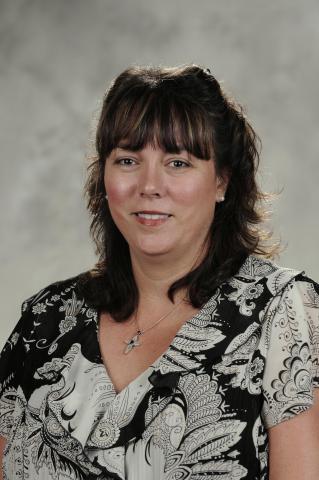ECE faculty members Christina M. Bourgeois and Elliot Moore, II were honored with Eta Kappa Nu Outstanding Teacher Awards on April 21 at the annual Eta Kappa Nu Spring Picnic.
Christina M. Bourgeois and Elliot Moore, II were honored with Eta Kappa Nu Outstanding Teacher Awards on April 21 at the annual Eta Kappa Nu Spring Picnic. The recipients of these awards are determined by a majority vote of the senior class of the Georgia Tech School of Electrical and Computer Engineering (ECE).
Bourgeois received the W. Marshall Leach, Jr./Eta Kappa Nu Outstanding Teacher Award. Since May 2000, she has been a faculty member with ECE and has served as the director of the Undergraduate Professional Communication Program, teaching ECE undergraduates that the ability to communicate effectively is the driver of success. Her impact is ongoing and far-reaching, as the program serves all 1,400+ undergraduate students through a series of required ECE courses, starting at the sophomore level and culminating in senior design.
Bourgeois applies the principles of Design Thinking to the writing process. By teaching students to view documentation and presentation in terms of problem framing and problem solving and by replacing the outmoded language of composition (audience, rough draft) with the language of engineering and entrepreneurship (end-user, prototype), she helps students to see the importance and value of communicating effectively.
Bourgeois coordinates the communication component in ECE 2031 Digital Design Lab, where she focuses on introducing students to the standards and conventions of engineering and technical writing. In 2011, she developed two new junior level communication courses – ECE 3005 Professional and Technical Communications for ECE and ECE 3006 Co-Curricular Professional Communications for ECE – specifically designed to promote student involvement in co-curricular activities and leverage existing participation, allowing students to use documentation and presentations prepared for industry, research experiences, and entrepreneurship initiatives.
In addition, Bourgeois trains and supervises ECE graduate teaching assistants who are assigned to ECE 2031, ECE 3005, and ECE 3006. In ECE 8901 Writing Consultant Practicum, she teaches graduate students to see themselves as instructors and not graders, so that the feedback they provide on writing assignments helps undergraduate students develop and improve as communicators.
Bourgeois’ interaction with ECE undergraduates extends beyond the classroom. She spends a significant amount of time and energy teaching students to write award-winning documentation packages for prestigious fellowships, scholarships, and competitive internships, as well as application essays to top tier Ph.D. programs.
Moore received the Richard M. Bass/Eta Kappa Nu Outstanding Teacher Award. A faculty member with ECE since August 2004 and currently an associate professor, he is also an alumnus of the School’s undergraduate and graduate programs, so he is very aware of the challenge and reward in the process of getting a degree from Georgia Tech. Moore recognizes how challenging learning the theory and practice of engineering can be and makes every effort to promote class discussion and conduct lively lectures to engage students and to encourage thought on how their education will benefit their lives well beyond any course at Georgia Tech.
Moore has directed several initiatives that help undergraduates to grow as engineering professionals. From 2007-2012, he was the director of an NSF REU Site known as CREATE (Collaborative Research Experiences in Advanced Technology and Engineering), which provided 10 weeks of funding for undergraduate students to conduct research with Georgia Tech faculty at the Savannah campus. Since 2015, Moore has been the director for the TIES program (Transfer Initiatives for Engineering Scholars), which provides need-based scholarships up to $10,000 for transfer students from two- and four-year schools.
Moore has served as one of the lead instructors for ECE 2026 Introduction to Signal Processing since fall 2013. Recognizing the challenge of teaching large classes of 100+ students, he initiated an effort to use clicker technology to improve classroom engagement and is a very big advocate of the use of technology in the classroom that helps engage and reinforce concepts rather than distract. Moore also directs a Vertically Integrated Projects team for the creation of mobile apps in assessment and therapy for persons suffering from neurological orders such as aphasia.
Over the years, Moore has received several “Thank-a-Teacher” notes and has provided research input and guidance for two successful NSF Graduate Research Fellowships for ECE students in 2014 and 2017.
Additional Images

